Strood Tree Surgeons (ME2): If you have sizeable trees in your garden in Strood, you will most likely need to have them looked at by a tree surgeon at some time. Cutting branches off trees just isn't an undertaking you ought to be tackling yourself, except when you've got the necessary skills and tools. A seasoned tree surgeon will have the required equipment and be conversant with the rules and legislation with regards to trees and their management.
There might be several different reasons why you feel the need to get in touch with a tree surgeon, so it will be helpful to skip through some of them now. Tree surgeons don't just handle damaged trees that could topple onto a property or road, like you may have witnessed after stormy conditions. They also accomplish such things as extracting old tree stumps that are causing annoyance, inspecting trees for disease or damage so that such problems will be dealt with early doors, reducing or thinning trees to let more light into the garden and creating tree management or maintenance plans to keep your trees in good condition.
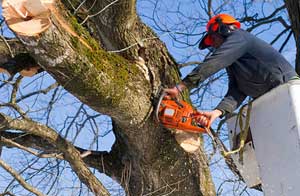
It is not just because of safety concerns that you should never try to do your own tree work, in addition there are checks and inspections that need to be done. Your might live inside a Conservation Area or your trees could be subject to a Tree Preservation Order (TOP), both of which will influence what can be done to your trees. A professional tree surgeon will be able to help you with all of this stuff and should additionally be a member of the Arboricultural Association, to provide reassurance concerning the work that is being undertaken. The appropriate public liability insurance is also crucial when it comes to tree management, so make sure that your tree surgeon is fully covered.
It is vital that your tree surgeon turns up with all of the necessary tools and equipment to undertake the process effectively and safely, because the protection of your family and home is the primary concern when work of this sort is being done. With the appropriate equipment and the ability to use it, tree surgery can be carried out in a fashion which poses little treat to anybody in the vicinity, or to the tree surgeon and his helpers.
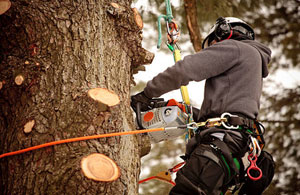
Using tree climbing and tree surgery equipment comes naturally to a certified tree surgeon, and he will gladly get to work using wood chippers, lowering winches, chain saws, slackline kits, rigging ropes, stump grinding machines, rigging plates, pole saws, harnesses, winches, axes and climbing ropes. This equipment can be very innovative and over time has been designed to render the tree surgery process both safer and easier.
The proper disposal of tree and related waste should be a legal responsibility for any tree surgeon, so you must confirm that your tradesman heeds that requirement. Tree surgeons will be able to let you view their waste carrier, dealer and broker licence, which enables them to dispose of waste materials in the correct manner. The safe removal and disposal of waste that results from the work on your property ought to be included in your estimate, so double check this before any work starts.
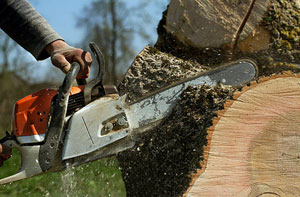
Strood tree surgeons offer their services all around the town, although you don't need to worry if you live outside Strood as all of them will willingly travel the short distance to areas like Cuxton, Lower Upnor, Shorne, Upper Upnor, North Halling, Cliffe Woods, Chattenden, Higham, Wainscott, Frindsbury etc. Therefore, this information will be to your benefit whether you are trying to find an experienced tree surgeon in Strood, or in the wider county of Kent or neighbouring counties.
Tree surgeons don't just climb up, fell and prune trees using specialist tools and machinery, they are also tasked with their protection and preservation. Understanding and observing the safety aspects of trees and woodland, to focus on possible risks is also part of their duties. A vital part of their obligations is making sure trees are disease-free, healthy and able to prosper and grow.
Tree surgery is available in Strood and also in: Meopham, Cliffe Woods, North Halling, Shorne, Cobham, Chattenden, Gravesend, Frindsbury, Gillingham, Lower Upnor, Cuxton, Upper Upnor, Higham, Rochester, Wainscott, and in these postcodes ME2 2DS, ME2 2FP, ME2 2JA, ME2 2QN, ME2 2DR, ME2 2FU, ME2 2PN, ME2 2JJ, ME2 2QE, and ME2 2JH. Local Strood tree surgeons will probably have the phone code 01634 and the postcode ME2.
If you need this type of service it is certainly advisable to hire an experienced tree surgeon. Strood home and property owners can benefit greatly from the expertise and knowhow offered by a trained professional.
Obtaining Help and Assistance
When talking to local Strood tree surgeons and arborists, you need to ask questions such as: Can you give me a written estimate? Are you able to give me references from previous customers? Are you joined to a professional association (such as The Arboricultural Association or the International Society of Arboriculture)? Do your working practices meet the British Standard? Do you and your workforce have the required certifications and qualifications (for tree management and the use of chainsaws)? Have you got public liability and employment insurance? to make certain they know what they're up to and that they'll not cause irreparable damage to your trees. If you don't receive satisfactory answers to any or all of these questions, you might want to find another a tree surgeon.

You'll want to visit the Arboricultural Association (AA) website to find a great deal of helpful advice concerning things to look for in a quality tree surgeon, along with a searchable directory of professional tree surgeons in the UK. The International Society of Arboriculture (ISA) is another fantastic resource which boasts a "verify tree surgeon's credentials" tool (here) and a "find an arborist" tool. You are also able to find a lot of info on tree surgery as a profession by going to the Wikipedia "Arborist" webpage here. Trustmark is a Government backed organization that's also a quality stop-off-point for finding trusted tradesmen. Considering exceptional trading practices, customer service and technical competence, Trustmark has consumer protection at its core.
Tree Root Problems Strood
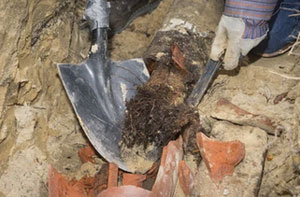
When they are growing too close to your house in Strood, some large trees have really invasive root systems, and can cause problems. Problems that can occur include blocked drains, damaged foundations and cracked patios. Some of the species of trees that have very invasive roots include sycamores, maples, willows and elms.
If you are planning to grow any new trees in your garden, it is recommended that you ensure that they are placed a reasonable distance from pathways, patio areas, your sewerage pipes and your home. If existing trees are growing too near to your house and are causing some of these problems, you must contact a tree surgeon in Strood, to see what can be done to resolve the situation.
If you wish to avoid the chance of killing off the tree or significantly affecting it's health you should not attempt to do this yourself and simply cut out any problematic tree roots. A professional tree care specialist in Strood will know which roots should be left, and which roots can be safely cut, so that the damage is minimised, but the tree can still get adequate nutrients and water to survive and thrive.
Shrub and tree roots often cause cracks in subterranean drains, especially when you consider that sewer pipes provide a constant source of nutrients and moisture. Small tree roots can quickly compromise a drainage system's joints, and once established develop into huge root balls which can cause joint failure and blockages. To eradicate the roots that are causing the problem, specialised root removal solutions will be provided by many local tree surgeons, who'll use high pressure jetting, manual rod clearance or electro-mechanical equipment.
Vegetation Control
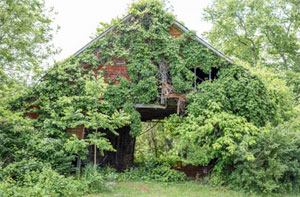
Although a lot of homeowners in Strood will believe that tree surgeons only address the removal and care of trees, that is simply not the situation, since most tree surgeons are also willing to attend to overgrown land and gardens that are choked with out-of-control plant growth. Usually tree surgeons will be willing to clear away bushes, overgrown vegetation, shrubs and weeds that might be thriving near patios, sheds, driveways, pathways or buildings, and creating a pain. If you're to manage your precious garden effectively then all of this ever increasing growth must be cut down every few months, and if you've got the inclination and time then this is undoubtedly a job that you could accomplish on your own if you are fit enough, or you might ask a tree surgeon to come now and again to make sure it is in shape. Vegetation control is essential if you're going to keep easy and safe access to every section of your garden and if this is forgotten the vegetation and plants will very quickly become a menace and take away the enjoyment of your garden. Besides anything else your garden will also look much better when properly maintained. (Tags: Vegetation Control Strood, Vegetation Management Strood, De-Vegetation Services Strood)
Tree Preservation Orders Strood
Another thing to consider before beginning work on your trees, is whether they've got a TPO (Tree Preservation Order) on them. To check whether any of your trees are covered by TPOs, contact your local planning authority. You can't carry out cutting down, lopping, topping, removal, wilful destruction, wilful damage or uprooting, without consent in writing from the relevant local authority, if a tree on your property is covered by a Tree Preservation Order. You could ask if your tree surgeon will help with these checks, any decent one will be happy to offer guidance and advice, or even do this for you.
If you are living in a conservation area in Strood, and plan to perform any work on a tree with a diameter of seventy five millimetres or more, you have to give a minimum of six weeks notice in writing to your local authority.
The International Society of Arboriculture
The ISA (International Society of Arboriculture) is an international, non-profit organisation which is based in Atlanta, GA, United States, it has the aim of fostering the benefits and awareness of trees. A membership association serving the tree care industry all around the globe, the ISA cultivates the professional practice of arboriculture.
Allowing those in the tree care sector to develop their skills, arboricultural expertise and knowledge, the ISA is firmly focused on research, education and technology, which it makes readily available by way of educational publications, services and events.
The AA (Arboricultural Association) was accepted as an associate organisation of the International Society of Arboriculture after signing a mid-2016 agreement with them. The relationship between the two organisations was therefore strengthened, and additional opportunities opened up for Great Britain and Ireland ISA members. UK tree care professionals having AA or ISA membership can now reap the wide and diverse benefits of being part of a unique global network. The International Society of Arboriculture now has professional affiliates and associate organisations in South Africa, Asia, New Zealand, Europe, Australia, and the UK, and now has an international membership of over 22000.
Chainsaws
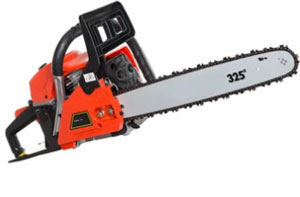
When it comes to the tools that are utilised by Strood tree surgeons, the most commonly seen is the chainsaw. Because of their ease of use and greater portability, petrol driven chainsaws are the most popular with tree care professionals, although battery and mains electric models are available. For heavy tree work, the only serious choice is to use petrol chainsaws, because they are able to effortlessly cut through branches and trunks of any dimensions, and are exceptionally powerful and robust.
Consisting of a rotating chain containing a row of sharp teeth that is driven by a motor and slices through the bark and wood, a chainsaw is essentially a fairly simple tool. For the varied tasks that are required, there are different designs of chainsaw, top-handled for working at height (and which can be used single handedly), rear-handled for working on the ground (two handed) and pole saws for long distance pruning and hard to reach branches.
Whilst clambouring up a tree with a rapidly twirling blade in your hand is an incredibly dangerous activity, it is rare to see a professional Strood tree surgeon who does not make use of a chainsaw. All tree surgeons need to be trained in the safe use of chainsaws, and it is one of the key requirements for membership of the AA (Arboricultural Association).
Although there are many different chainsaw brands and models available to tree care professionals, the most popular ones Strood are Makita, Hyundai, Stihl and Husqvarna.
Firewood and Logs Strood

Of course, you might need a tree surgeon for a completely different reason, since they're normally a good source for logs and firewood in Strood. As felling trees and chopping off branches is a major part of their daily schedule, this is a natural offshoot for an enterprising tree surgeon.
Some Strood tree surgeons will charge you for seasoned and chopped logs which are fully dried out and ready for burning, while others might be willing to give you logs and branches cost-free, because they usually have loads of them to get shot of.
Bunging "wet" logs on your open fire or wood burner is not a good idea, and will produce lots of smoke and block up your flue. Only use logs which have been left to dry for at least 12 months and have a moisture level of twenty percent or lower. Most often tree surgeons in Strood will have supplies of hardwood logs, and the benefit of these is that they give a long, sustained burn, providing three or four hours of comforting heat. If you are also able to lay your hands on a few softwood logs, these are terrific for starting a fire, and onto which you can bung your dry hardwood logs once your fire is blazing.
Protecting Trees & Shrubs in the Wintertime
Protecting your trees and shrubs in winter is maybe something that you haven't thought that much about, maybe assuming that the winter weather conditions in the UK are not harsh enough to warrant this. The winter months can actually be a tough time for trees, plants and shrubs and even those that we usually think of as hardy can benefit from a bit of additional protection in times of intense cold.
Naturally where trees are concerned it's strong winds that can cause the biggest problems and despite the fact that many trees will have shed their leaves, they can still suffer damage in windy weather. If the weather conditions in Strood have been windy, and a tree in your garden seems to be damaged or at risk of toppling over, it is a good idea to call in a tree surgeon to check whether any remedial action is necessary. You can also have problems with breaking branches due to heavy snow, therefore when such weather is expected, be on the lookout for potential damage. In the depth of winter, your shrubs and trees might need some protection from ice and frost. Laying a blanket of mulch round the bases of the stems will enable them to continue absorbing moisture and stop the surrounding soil from freezing.
Deadwooding Strood
Dead-wooding (or deadwooding) is an important part of tree management and care, and all competent Strood tree surgeons will undertake this practice where needed. Dead-wooding involves the careful removal of dead and dying branches that may pose a danger to vehicles, homes or pedestrians. The branches of trees can die off for a number of different reasons, with excessive shading, diseases, a damaged root system or attack by pests, acknowledged as the most typical.
While the purpose of safety is the most frequent reason for dead-wooding, the process can also be carried out for aesthetic motives and for the benefit of the tree. It's possible to dramatically improve a tree's health by eliminating dead, dying and damaged branches, too many which will encourage the spread of disease and insect infestations. A tree with lots of dead wood also looks unsightly and spoils its appearance, therefore this should be removed to get your tree looking beautiful once again.
Only larger dead branches will be cut out in most situations, as very little risk is posed by the smaller ones. On the other hand, where a home, a public area, a park, a garden or a highway in Strood is overhung by trees, any dead branches of over 50mm diameter may need to be removed. (Tags: Deadwooding Trees Strood, Dead-Wooding Surgery Strood, Dead-Wooding Strood, Deadwooding Strood).
Hedge Cutting Strood
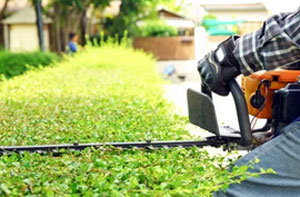
Despite the fact that Strood tree surgeons are mainly associated with the care and maintenance of trees and shrubs they are regularly brought in to cut back hedges. When you have Leylandii or similar conifer hedges, this is especially vital, since they can grow so tall that a homeowner or gardener will find them virtually impossible to tackle using bog standard tools.
A hedge that is uncared for or poorly maintained will become overgrown and pretty quickly get out of control. Routine trimming is advisable if you do not want a hedge to take over large areas of your garden in Strood, and in addition to making the hedge healthier it also looks better aesthetically.
Neat hedges help to make your entire garden look tidier, and might even add value to your home in Strood, if you are planning to sell.
Air-Spading Strood
When you're worried about the overall health of a tree, it could be due to a number of factors, but problems with the root system is a common cause of such concerns. A qualified Strood tree surgeon may need to gain access to a tree's roots to check for root rot, soil compaction, or other problems.
Because there is a chance of damaging the roots during the digging process, previously this was a tricky thing to achieve. To successfully break down and clear away compacted soil without damaging tree roots or buried utility lines, a contemporary system that's frequently used by tree surgeons is "air spading".
On occasion, passing vehicles, construction work or heavy foot traffic can cause the soil around a tree's roots to become compacted, and this is known to have an adverse effect on its health. When it does not get enough water and nutrients, a tree can quickly become "stressed", rendering it more vulnerable to attack by diseases, pests and insects. Also a good technique for solving root flare problems, air-spading can be employed to effectively remove the soil from the base of a tree which has become covered in soil, increasing the chances of root rot.
Directing air into the soil at a speed of twelve hundred miles per hour, the air-spading process involves the use of an air compressor and an air-spading tool which forces air into spaces in the soil, causing it to break up instantly, but not impacting the tree roots or utility lines. Immediate inspection can be accomplished, as the flow of air blows the soil away from the roots. Any problems can then be remedied and the soil exchanged for a less dense layer of chip mulch and fertiliser to encourage the tree to rejuvenate.
Eco-Plugging Strood
The typical technique used for removing stumps by most Strood tree surgeons is stump grinding. However, "eco-plugging" is becoming increasingly more popular as an easier and less costly solution to this issue. Eco-plugging is not only less costly, but it is also handy for use in hard-to-reach locations that are largely inaccessible to stump grinding machines.
For killing off tree stumps without affecting any nearby trees and vegetation, eco-plugging is an exceptionally effective treatment. Eco-plugs can be employed in any weather conditions and at any time of the year, and they eliminate the stump by killing off the entire root system. Effective for use on a wide selection of trees, eco-plugs are 95-100 percent effective and contain a type of crystalline glyphosate herbicide. (Tags: Eco-Plugging Tree Stumps Strood, Eco-Plug Treatments Strood, Eco-Plugs Strood, Eco-Plugging Strood).
Ash Dieback
Most likely to wipe out close to 80 percent of the current British ash tree population, in the next few years, ash dieback (Hymenoscyphus fraxineus) is a deadly fungal disease of ash trees that was first recorded in the United Kingdom in 2012. Following the disaster of Dutch Elm Disease, which killed the United Kingdom's elm trees, ash dieback is set to have huge repercussions for our countryside.
A damaging disease of the Fraxinus genus of trees, ash dieback has an especially devastating effect on the Fraxinus excelsior (common ash), British Fraxinus excelsior (common or European ash). Originally coming from eastern Asia where the native Chinese ash (Fraxinus chinensis) and Manchurian ash (Fraxinus mandshurica) are less seriously affected by it, the fungus which causes the disease is known as Hymenoscyphus fraxineus (H. fraxineus), and it kills the tree by blocking its vascular systems.
Readily spread by minute spores released from the fruiting bodies of the fungus, and can be blown for miles on the wind, ash dieback (or chalara ash dieback as it's often known) is prevalent in most areas of Britain with up to 85% mortality rates.
Ash dieback affects trees of all ages and has symptoms such as:
- New growth appears from previously dormant buds.
- Dying shoots and leaves are visible in summer.
- Dark brown lesions (often diamond shaped) form where limbs join the trunk, and the inner bark under the lesions looks brownish grey.
- Dark patches on leaves during the summertime.
- Foliage that wilts, turns black and falls prematurely.
Some ash trees have the tenacity to fend off early infections, but as the disease returns every year, they eventually perish. At this time there's no apparent technique for stopping the spread of achalara ash dieback, and there's no cure or effective treatment.
If you believe that you have spotted a tree infected with ash dieback on your property in Strood, or someplace in the local community, you can report it to the "Tree Alert Service" provided by the Forestry Commission, although chalara ash dieback is so prevalent throughout the UK that they're really only interested in hearing about cases discovered in areas not previously affected. You can still however speak to a local tree surgeon, who'll offer advice and guidance on how best to proceed.
Fundamental Skills for a Tree Surgeon in Strood
- Be professional and able to complete tasks within a given timeframe.
- Have an organised and methodical way of working.
- Have essential computer skills and know how to carry out basic tasks with handheld devices.
- Physical skills like coordination and movement.
- Have the ability to use, maintain and repair tools and equipment.
- Have a good understanding of public security and safety.
- Patience and the ability to remain calm and focused in stressful situations.
- The cabability to work well with other folks.
- Be able to work well with your hands.
- Be conscious of the dangers and complexities involved in all areas of work.
- Decent customer skills.
Crown Thinning Strood

The removal of small live branches on the outer areas of the tree's crown, yet not altering the shape or size of the tree, is called crown thinning. This procedure is done to result in a consistent density of leaves, which itself accomplishes a number of goals such as: to lower the overall weight of the crown, to enable more light to pass through, to lessen the stress on certain branches because of gravity, wind, snow, or ice, to lower the wind resistance of the tree or to prevent the tree from uprooting in blustery conditions. Crown thinning isn't supposed to change the overall size and structure of the tree, but should establish a uniform foliage density around evenly spaced branches. It should be possible to find crown thinning services in Cuxton, Lower Upnor, Shorne, Upper Upnor, North Halling, Cliffe Woods, Chattenden, Higham, Wainscott, Frindsbury, and in Strood. (Tags: Crown Thinning Strood, Crown Thin Strood, Tree Crown Thinning Strood)
Leylandii Hedge Removal
For property owners in Strood, Leylandii hedges are a preferred choice for their fast growth and privacy features. However, they can rapidly become overgrown and burdensome to maintain. Before removing a Leylandii hedge, it is crucial to think about a few critical factors. The initial step is to make sure that the hedge is not covered by any legal designations or restrictions, such as a Tree Preservation Order. If the hedge is covered by legal safeguards, you must obtain the local council's consent before removing it. Additionally, Leylandii hedges can possess extensive root systems, which underscores the need to employ a certified tree surgeon to safely remove both the hedge and its roots. Finally, once the hedge is removed, you'll need to dispose of the waste responsibly. In a nutshell, removing a Leylandii hedge can be a hazardous and time-consuming enterprise, necessitating the adoption of necessary safety measures and potentially engaging the services of a professional.
Tree Surgery Tasks Strood

Strood tree surgeons can normally help with crown raising, tree bracing, eco plug treatments, crown removal, tree lightening protection Strood, soil terravention, formative pruning, crown thinning in Strood, root pruning, tree watering, brush cutting services in Strood, tree maintenance, woodchipping, arboriculture, woodland clearance, fruit tree pruning Strood, stump grinding, felling of storm damaged trees in Strood, tree management, tree care in Strood, dead wooding Strood, commercial tree surgery, tree felling in Strood, tree shaping, tree waste removal, damaged tree cutting and removal in Strood, crown lifting, shielding trees from grazing in Strood, stump treatment Strood, root grinding, hedge lowering, domestic tree care, retrenchment pruning, tree dismantling, site clearance and other tree surgeon services in Strood, Kent. These are just a handful of the activities that are conducted by local tree surgeons. Strood specialists will let you know their whole range of services.
Tree Surgeons Near Strood
Also find: Higham tree surgeons, Cuxton tree surgeons, North Halling tree surgeons, Upper Upnor tree surgeons, Wainscott tree surgeons, Gillingham tree surgeons, Rochester tree surgeons, Cliffe Woods tree surgeons, Shorne tree surgeons, Meopham tree surgeons, Cobham tree surgeons, Frindsbury tree surgeons, Lower Upnor tree surgeons, Gravesend tree surgeons, Chattenden tree surgeons and more. All of these villages and towns are covered by tree surgeons. Local business and home owners can get price quotes by going here.
Tree Care Services Strood
- Air-Spading
- Dead Wooding
- Hedge Planting
- Tree Removal
- Root Removal
- Tree Reduction
- Stump Treatment
- Root Grinding
- Tree Watering
- Tree Care
- Tree Surveys
- Crown Removal
- Tree Lopping
- Tree Planting
More Strood Trades: Not surprisingly, when you're having tree surgery done in Strood, Kent, you will likely need other garden related services, and apart from a tree surgeon in Strood, Kent, you might additionally need decking fitters in Strood, weeding services in Strood, patio layers in Strood, soil irrigation in Strood, hedge shaping in Strood, landscape gardeners in Strood, driveway specialists in Strood, pond maintenance in Strood, lawn mowing in Strood, garden clearances in Strood, fencing contractors in Strood, artifical grass in Strood, waste removal in Strood, garden design in Strood, garden shed builders in Strood, SKIP HIRE in Strood, and other different Strood tradespeople.
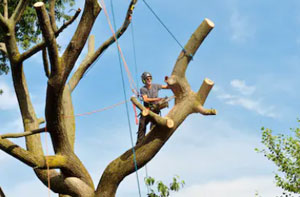 Tree Surgeon Strood
Tree Surgeon Strood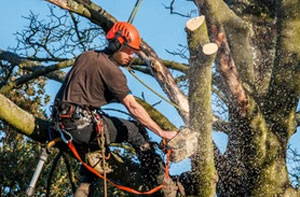 Tree Surgeons Strood
Tree Surgeons Strood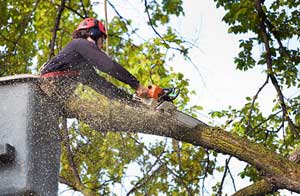 Tree Surgery Strood
Tree Surgery StroodTo find local Strood information go here
More: Tree Maintenance, Woodland Management, Tree Reduction, Dead Wooding, Crown Reduction, Tree Felling, Tree Felling, Site Clearance, Tree Watering, Arboriculture, Tree Removal, Cable Bracing, Stump Removal, Tree Inspections, Soil Terravention, Tree Surveys, Air-Spading, Vegetation Management, Tree Surveys, Tree Dismantling, Soil Terraventing, Crown Removal, Tree Shaping, Tree Planning, Tree Transplanting, Hedge Reduction, Forestry Management, Crown Reduction, Root Grinding, Stump Grinding.
Tree Surgeon Jobs Strood: Find Strood tree surgeon jobs here: Strood Tree Surgeon Jobs
Tree Surgery ME2 area, phone code 01634.
Tree Care Strood - Stump Removal Strood - Tree Surgeons Strood - Tree Removal Strood - Tree Management Strood - Tree Surgeon Strood - Tree Surgery Strood - Arboriculture Strood - Crown Lifting Strood





